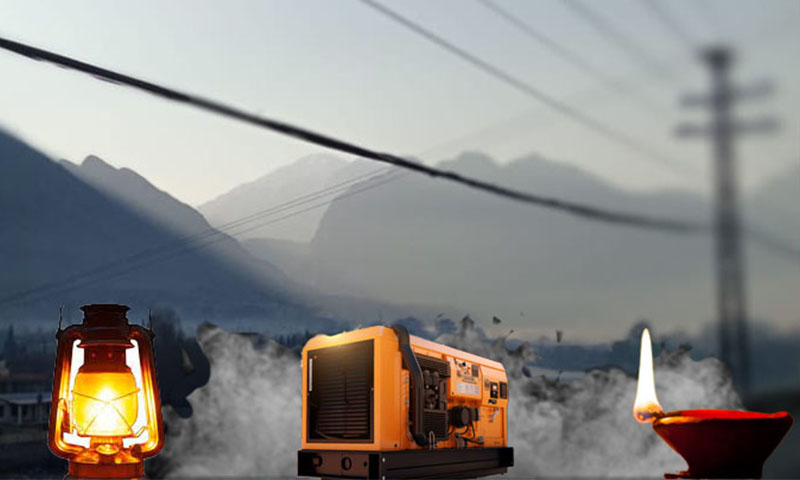- Web Desk
- Feb 19, 2026
Prolonged blackouts take a toll on G-B’s environment, economy
-

- Tanveer Abbas
- Dec 20, 2024

GILGIT: The picturesque region of Gilgit-Baltistan, known for its pristine environment, is grappling with a worsening energy crisis as prolonged and frequent blackouts continue to disrupt daily life.
With dwindling water flow amid sub-freezing temperatures, the situation has reached alarming levels, severely impacting residents, businesses, and the environment. The majority of the region is experiencing power outages lasting over 24 hours, forcing residents and businesses to rely on unsafe energy alternatives.
For many, power outages have become a harsh reality, with restaurants, banks, freelancers, and other businesses among the hardest hit. “We can’t afford these prolonged outages. Our work relies on consistent electricity, and these blackouts are pushing us to the brink,” lamented Hujjat Hussain, a local freelancer.

In a bid to cope, many businesses and households have resorted to diesel generators and burning wood, plastic, and tires, exacerbating the environmental crisis. The once-clear skies of Gilgit are now often shrouded in smoke, with chimneys from homes, hotels, and even barber shops spewing dark emissions.
The environmental toll is becoming increasingly visible. Recently, a video showing thick smoke emitted from a malfunctioning diesel generator at Serena Hotel in Karimabad, Hunza, went viral on the internet, drawing sharp criticism on social media. Residents condemned the incident and called for immediate action to address the crisis.

Social media platforms have been flooded with outrage and demands for accountability. Local activists have called on authorities to prioritize renewable energy solutions and enforce stricter regulations on emissions.
Activist Safiullah Baig highlighted the environmental damage caused by large-scale diesel generator usage, particularly by big hotels like Serena, which operate generators with capacities of about 1 megawatt to power 100 rooms, swimming pools, and other luxury facilities.
“The energy consumption of such hotels equals the needs of around 1,000 households. The carbon and other hazardous particles emitted from these generators settle on glaciers, accelerating their melting and contributing to environmental destruction.”
Baig emphasized the need for hotels to adopt solar energy solutions until the government can provide clean energy. “Diesel-based generators should be stopped, and businesses using them must be monitored and regulated,” he added.
While condemning the burning of tires for energy, Baig noted that such practices are less frequent and can be addressed through public awareness campaigns. However, he warned that diesel-based generators pose a more immediate and severe threat to the environment.
He also called for the introduction of a public transport system in the region to reduce reliance on private vehicles. “Electric buses for public transport should be introduced to reduce the environmental footprint,” he urged.
Reacting to public complaints, the Gilgit-Baltistan Environmental Protection Agency (G-BEPA) has issued a notice to the Serena Hotel in Hunza. The notice states that a diesel generator at the hotel was found to be emitting significant amounts of smoke containing dust particles, posing a serious threat to the environment and public health.

“The use of a low-quality diesel generator by a renowned hotel chain, such as Serena Hotel, raises concerns about the management’s apparent disregard for its social responsibility, environmental stewardship, and the well-being of the local community. This practice is also a clear violation of the Gilgit-Baltistan Environmental Protection Act 2014, its subsequent rules and regulations, and the terms and conditions of the No Objection Certificate (NOC) issued to the hotel,” the notice reads.
The G-BEPA has directed the hotel to immediately cease operations of the offending diesel generator and install an energy-efficient generator meeting Euro IV standards within 15 days. Additionally, the agency has demanded a detailed report on the actions taken to address the issue within 24 hours.
“Failure to comply with these directives will result in the sealing of the hotel facility and the imposition of fines under the relevant provisions of the Gilgit-Baltistan Environmental Protection Act 2014, along with the cancellation of the NOC issued,” the notice warns.
When contacted, a representative of Serena Hotel Hunza claimed that “the relevant government agencies” had visited the hotel for an inspection and “left satisfied.”
Read next: 56 per cent increase in tomato prices drives weekly inflation up




